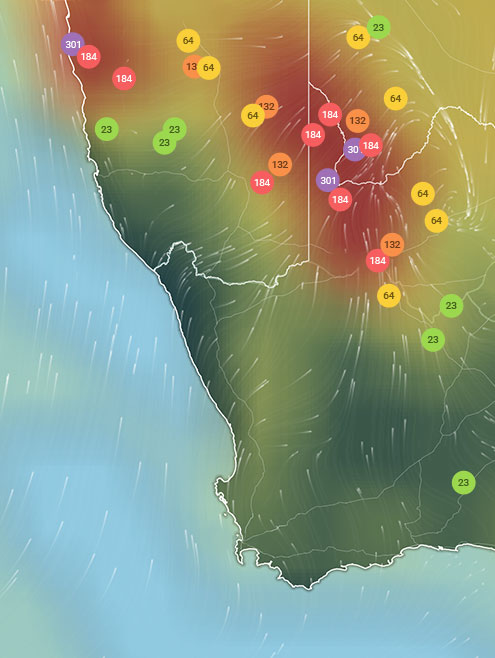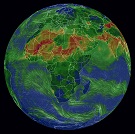Get a monitor and contributor to air quality data in your city.
12K people follow this city






AIR QUALITY DATA CONTRIBUTORS
Find out more about contributors and data sources| Weather | Scattered clouds |
| Temperature | 82.4°F |
| Humidity | 18% |
| Wind | 11 mp/h |
| Pressure | 30.3 Hg |
| # | city | US AQI |
|---|---|---|
| 1 | Cadereyta Jimenez, Nuevo Leon | 95 |
| 2 | San Pedro Garza Garcia, Nuevo Leon | 90 |
| 3 | Santa Catarina, Nuevo Leon | 90 |
| 4 | Monterrey, Nuevo Leon | 89 |
| 5 | General Escobedo, Nuevo Leon | 88 |
| 6 | San Nicolas de los Garza, Nuevo Leon | 87 |
| 7 | Mexico City, Mexico City | 84 |
| 8 | Celaya, Guanajuato | 78 |
| 9 | Salamanca, Guanajuato | 68 |
| 10 | Guadalajara, Jalisco | 62 |
(local time)
SEE WORLD AQI RANKING
| # | station | US AQI |
|---|---|---|
| 1 | Calle 8 B Sur | 62 |
(local time)
SEE WORLD AQI RANKINGUS AQI
62
live AQI index
Moderate
| Air pollution level | Air quality index | Main pollutant |
|---|---|---|
| Moderate | 62 US AQI | PM2.5 |
| Pollutants | Concentration | |
|---|---|---|
| PM2.5 | 17.6µg/m³ | |
PM2.5
x3.5
PM2.5 concentration in Puebla is currently 3.5 times the WHO annual air quality guideline value
| Sensitive groups should reduce outdoor exercise | |
| Close your windows to avoid dirty outdoor air GET A MONITOR | |
| Sensitive groups should wear a mask outdoors GET A MASK | |
| Sensitive groups should run an air purifier GET AN AIR PURIFIER |
| Day | Pollution level | Weather | Temperature | Wind |
|---|---|---|---|---|
| Sunday, Apr 14 | Moderate 70 AQI US | 82.4° 59° | ||
| Monday, Apr 15 | Moderate 62 AQI US | 86° 60.8° | ||
| Tuesday, Apr 16 | Moderate 81 AQI US | 84.2° 59° | ||
| Today | Moderate 62 AQI US | 84.2° 59° | ||
| Thursday, Apr 18 | Moderate 67 AQI US | 86° 60.8° | ||
| Friday, Apr 19 | Moderate 69 AQI US | 82.4° 60.8° | ||
| Saturday, Apr 20 | Moderate 74 AQI US | 78.8° 59° | ||
| Sunday, Apr 21 | Moderate 73 AQI US | 80.6° 60.8° | ||
| Monday, Apr 22 | Moderate 70 AQI US | 80.6° 62.6° | ||
| Tuesday, Apr 23 | Moderate 73 AQI US | 78.8° 60.8° | ||
| Wednesday, Apr 24 | Moderate 77 AQI US | 80.6° 60.8° |
Interested in hourly forecast? Get the app
Puebla, also known in Spanish as Puebla de Zaragoza, formally Heroica Puebla de Zaragoza. It is the seat of Puebla Municipality, the capital and largest city in the state of Puebla, and the second largest in colonial Mexico. A census conducted in 2020 estimated the population to be in excess of 1.5 million people and over 3 million in the entire metro area.
Towards the end of 2021, Puebla was experiencing a period of “Moderate” air quality with a US AQI reading of 55. This reading is often used as a reference point when comparing air quality in other cities around the world. Data is collected with regards to the six most prolific air pollutants commonly found and this figure is calculated from there. If information is not available for all six, then a figure can be deduced using the information that is available. In the case of Puebla, only the level of PM2.5 was recorded which was 14.1 µg/m³.
This PM2.5 level can be seen to be just less than one and a half times higher than the suggested level of 10 µg/m³. This level has been determined by the World Health Organisation (WHO) as being an acceptable level of air pollution, although no level is to be considered as being safe. When air pollution is in the “Moderate” bracket, the advice given is to remain indoors as much as possible and close all windows and doors to prevent the ingress of more polluted air. Those who are more sensitive to poor quality air should try not to venture outside until the air quality has improved. If this is unavoidable, then a good quality mask should be worn at all times. There is a downloadable app from AirVisual.com which could help with your decision because it relays the status of the air quality in real-time.
Air quality can be very volatile as it can be affected by many variables. Looking back at the figures for 2020 published by IQAir.com, it can easily be seen that the month with the best air quality was in May when it was classified as being “Good” with a figure of 12 µg/m³. The months of February through until April and from June until the end of October saw the air quality classified as being “Moderate” with readings between 12.1 and 35.4 µg/m³. The remaining months of November, December and January saw air quality in the “Unhealthy for sensitive groups” bracket with figures between 35.5 and 55.4 µg/m³.
Records pertaining to air pollution were not kept before 2020 when a figure of 24.6 µg/m³ was recorded which could be classed as “Moderate”. This may not be a true reflection on reality because of the measures put in place to try to stop the spread of the COVID-19 virus. Many motorists were no longer required to commute to their offices each day which reduced air pollution in the city centres dramatically. There were also some factories and similar production units which were told to close on a temporary basis. Many cities throughout the world noted how much cleaner their city air was because of these measures.
The pollutants that most frequently determines poor air quality in the city of Puebla are PM10 (24%), followed by O3 (17%) and PM2.5 (2.5%).
Puebla is the third most polluted metropolitan area in the country with PM10, suspended particles of dust, soot or ash, which are related to respiratory diseases and premature deaths.
A large part of the polluting emissions come from transport, for this reason, vehicle management programs must be updated and measures such as Hoy No Circula should be strengthened. This would prevent traffic from entering certain areas within the city.
The pollutants in the air are nitrogen dioxide, tropospheric ozone, sulphur dioxide, among others.
All these agents are originated, among others, by road traffic in our cities, heating systems, industries, power plants, refineries and incinerators.
Although in recent years the different governments have increased the control of polluting factors through more rigid laws, it is true that air quality does not improve as much as it should and that is why we will continue to suffer the secondary effects of air pollution on our health.
In order to improve air quality, reduce pollution rates in the Puebla Valley metropolitan area and mitigate its effects in the short and medium term, the state government implements actions immediately. In coordination with the State Highway Administration, operations will be carried out on mobile sources, particularly on public transport units that are outside the norm.
To help improve air quality in a natural way, through the General Coordination of Natural Resources, a day of reforestation of the state parks of the metropolitan area of Puebla is implemented. In the short term the planting of 10,000 trees will be carried out in Cerro Zapotecas and 6,000 more in Bicentennial Park.
More investment in sustainable mobility to promote projects in favour of pedestrians and cyclists, as well as zero-emission public transport are to be introduced.
Members of the Puebla City Council agreed on a series of actions in favour of improving air quality, such as identifying vacant lots owned by the Commune to transform them into green areas, in addition to urging all municipal public servants not to use their private vehicle every Wednesday. to move to your source of work.
According to the World Health Organisation (WHO) "urban air pollution increases the risk of suffering from acute respiratory diseases, such as pneumonia and chronic diseases, such as lung cancer and cardiovascular diseases." Air pollution affects us both short- and long - term side effects, those that are more likely to suffer them are children, the elderly and people suffering from pre-existing illnesses.
People who die annually from the secondary effects of urban air pollution amount to more than 1.3 million people, of these deaths, more than half occur in developed countries, since people who reside in cities with high level of air pollution suffer more heart disease, respiratory problems, lung cancers and allergies.
1Contributor
Anonymous Contributor

1 station
1 Data source